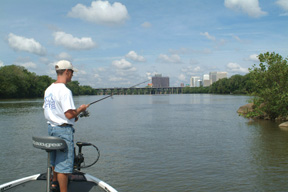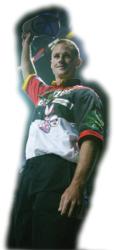Performance Profile: Crews control
John Crews has found his stride on the tour

John Crews has been to enough bass tournaments to know what happens when Kevin VanDam appears on stage.
“Most of the time, Kevin VanDam gets the loudest cheers,” Crews said. “I always think, `Man, that’s what I want.'”
On a cool September evening this past fall, Crews got it.
He’d just fished in the final round of the 2003 Wal-Mart FLW Tour Championship on the James River and now was on the stage with the event’s 11 other finalists.
VanDam’s introduction drew the usual heavy cheers, but the standing-room-only crowd really went crazy for Crews.
“It was awesome,” Crews said.
It didn’t hurt that Crews was the hometown favorite, hailing from a small town not far from the tournament’s Richmond headquarters. Yet it’s also clear that the bass fans outside Virginia are taking notice of the charismatic young pro as he works to make a name for himself in bass fishing’s top ranks.
Crews’ rise to prominence is no surprise to former bass pro Dr. Greg South, a Virginian who has watched Crews evolve from an eager youngster to a tournament contender.
“With his motivation, focus and commitment, I don’t see why he can’t be a top-10 fisherman on a consistent basis,” said South, runner-up in the 1984 Bassmasters Classic. “He’s paid his dues. He’s worked hard.”
 In only his second year as a pro on the FLW Tour, the 25-year-old Crews put together a more-than-solid season in 2003. Not only did he hook a third-place finish at Lake Murray, Crews fished consistently well enough to finish 34th in the regular-season rankings, earning a coveted spot in the 48-man field for the $1.5 million championship.
In only his second year as a pro on the FLW Tour, the 25-year-old Crews put together a more-than-solid season in 2003. Not only did he hook a third-place finish at Lake Murray, Crews fished consistently well enough to finish 34th in the regular-season rankings, earning a coveted spot in the 48-man field for the $1.5 million championship.
The championship tournament and its unique head-to-head format certainly put the spotlight on Crews. The only Virginian in the event, Crews was assumed to have an edge on the familiar waters of the tidal James River system. Crews was aware of the high expectations.
“I was going to be disappointed if I didn’t make the finals,” he said.
Despite the pressure, and the unusually tough conditions on the wind-whipped James River, Crews didn’t buckle. First he upset legendary pro Rick Clunn of Ava, Mo. Then he bested 10th-seeded Mike Hawkes of Sabinal, Texas, to advance to the finals.
On the tournament’s final day, Crews boated just one keeper, but the 2-pound, 7-ounce bass was enough to clinch eighth place. The $24,000 check was the biggest payday of Crews’ young career.
The beaming Crews was cool and collected while sharing a stage with some of bass fishing’s legends. It was almost like he had been preparing for the moment for years, and in a sense he has.
Crews grew up and still lives in Jetersville, Va., a small town about 45 minutes from the heart of Richmond. Unlike so many kids who are led to fishing by parents, Crews got started on his own.
“We had a little pond in the backyard, and I would go down there fishing on my own,” Crews said.
The pond held bluegills, catfish and bass. From the beginning, Crews had a one-track mind.
“All I wanted to catch were the bass,” said Crews, who still remembers his first big one – a 4-pounder that hit a plastic worm when Crews was just 6 years old.
Although Crews’ father, Bill, was more into bird hunting than bass fishing, he supported his son’s passion. The two would sometimes travel to lakes in South Carolina and Florida. Bill Crews would hire a guide, and young John would soak up the information.
When the younger Crews was 10 or 11, his dad brought the lake to him, having an 8-acre pond built on the family’s property.
“He still fishes it when he wants to try out new lures,” Bill said.
At 16, John entered his first tournament – a Wal-Mart Bass Fishing League event. Competing as a co-angler, Crews didn’t do well, but he was hooked anyway.
“I met so many good people,” said Crews, who said he remains close with many of the anglers he met and fished with as a co-angler in those early tournaments.
It’s probably a good thing that Crews was not focused solely on results during his first few years of competition. If so, he probably wouldn’t be making a living as a pro angler today.
“It was three years before I caught a limit,” he said with a laugh.
 By then Crews had connected with South, and the radiologist from Richmond had become a trusted mentor. South offered not only fishing advice but also encouragement.
By then Crews had connected with South, and the radiologist from Richmond had become a trusted mentor. South offered not only fishing advice but also encouragement.
“I’d tell him that if it was easy, everybody would be doing it, and that we often learn more when we go out and can’t catch fish than when we go out and it’s easy,” South said.
Crews stuck it out and eventually started taking home checks in tournaments.
After graduating from high school, Crews enrolled at Randolph-Macon College in Ashland, Va. By then he was already starting to think about taking a shot at fishing for a living. Again, his father was supportive.
“As parents, we tend to want our kids to do what we do,” said Bill, an attorney. “I told him, `You get good grades in college, and I’ll support your decision.'”
At Randolph-Macon, Crews’ classmates were curious about competitive bass fishing.
“Everybody I went to college with was totally intrigued by it,” he said. “They were like, `You can make money at this?'”
Crews hoped so, which is why he worked toward his potential career as a pro bass fisherman both in and out of the classroom. On weekends, he competed in bass tournaments. During the week, he studied business and economics. Crews knew that establishing a career as an angler required more than just a knack for catching bass.
“I figured out early that you have to be good at the business side as well as the fishing side if you want to make a living,” Crews said.
Crews has followed through on that philosophy. The Yamaha pro currently has agreements with about 10 sponsors, including Tyson Foods. It’s a good number, he thinks.
“If you have a limited number of sponsors, you can keep everybody happy,” said Crews, adding that he thinks it’s important to give his supporters a return on their investment in him.
South isn’t surprised to see companies approaching Crews.
“He’s a good-looking young man who’s smart, educated, well-mannered and happens to be a good fisherman,” South said. “That’s what corporate America is looking for.”
In the spring of 2000, just before graduating with a bachelor’s degree in business and economics, Crews was still looking for his first big win. Then, in a single-day BFL tournament on Virginia’s Lake Gaston, he came close. His 16 1/2-pound, five-fish sack of bass was good enough for fourth.
“I was thinking, `Maybe I can do this,'” Crews said.
To concentrate full time on fishing – from the front of the boat by that time – Crews needed support. Again, his dad stepped up.
Crews, who is single, made a promise.
“I said, `How about a year? If I’m not doing well, I’ll quit and get a real job,'” Crews said.
The year was tough.
“I was thinking it would happen that year,” he said of the FLW Tour. “I was hoping to go out and set the world on fire. I had four good tournaments but two bad tournaments.”
After doing well enough to keep himself in the game, Crews found his stride on the FLW Tour in 2003. He would have loved to have capped the season with a win and the $500,000 top prize in the championship. Still, he relished his time in the spotlight.